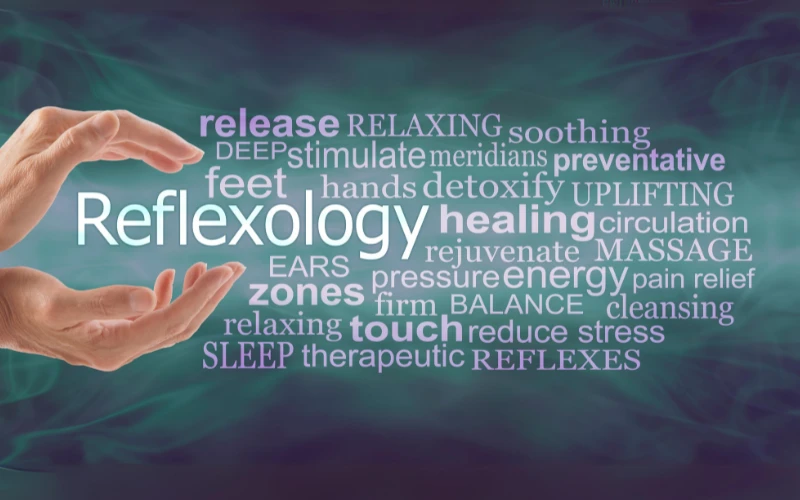Reflexology, a therapeutic method involving pressure on specific areas of the feet, hands, or ears, holds a revered place in complementary and alternative medicine. This guide delves into the reflexology benefits for various health conditions, including stress, chronic pain, digestive issues, sleep disturbances, and headaches.
Key Sections :
Reflexology Benefits for Stress Reduction
One of the key benefits of reflexology is its ability to reduce stress, which is accomplished through its stimulation of the nervous system. This stimulation helps to decrease overall tension in the body and promotes a sense of wellbeing. The practice focuses on specific reflex points that correspond to various body organs and systems, including the adrenal glands, which play a critical role in the body’s stress response.
How Reflexology Mitigates Stress :
Reflexology works by stimulating the body’s natural healing mechanisms, promoting relaxation, and reducing tension. By targeting key reflex points, practitioners can help alleviate stress and its associated symptoms. Here’s how reflexology mitigates stress:
- Stimulation of the Nervous System:
- Reflexology involves applying pressure to specific points on the feet, hands, or ears that correspond to different parts of the body. This pressure stimulates the nerves and can help to calm the nervous system, reducing feelings of stress.
- Targeting the Adrenal Glands:
- The adrenal glands, which are key components of the body’s stress response system, can be influenced through reflexology by targeting their corresponding reflex points on the feet. This helps to regulate the release of stress hormones like cortisol, which, when elevated, can lead to increased stress and anxiety.
- Promotion of Relaxation:
- By reducing the activity of the stress response and encouraging relaxation, reflexology can help shift the body from a state of ‘fight or flight’ to ‘rest and digest’. This transition is crucial for mood regulation and anxiety reduction.
- Holistic Impact:
- The overall impact of reflexology extends beyond simple relaxation. By improving circulation and reducing stress, it can have a holistic effect on health, including better sleep, reduced anxiety, and enhanced mood stability.
Reflexology’s approach to stress reduction is supported by both anecdotal evidence and some clinical studies, though more robust research is often cited as needed to fully understand its efficacy. For many, the therapy offers a gentle and natural method to manage stress, contributing to an improved sense of mental and physical wellbeing.
Pain Management with Reflexology
Reflexology is increasingly popular for its ability to manage pain, a benefit that stems from its interaction with the body’s pain pathways and circulatory system. By applying targeted pressure to specific reflex points on the feet, hands, or ears, reflexology can prompt significant physiological changes in the body, particularly in how it processes and perceives pain.
Key Aspects of Pain Management through Reflexology:
- Interruption of Pain Pathways:
- Reflexology may help to disrupt the pathways that signal pain to the brain. This interruption can reduce the perception of pain, especially in chronic conditions such as arthritis or back pain. The theory is that reflexology might help to reset the nervous system or distract it from pain signals.
- Improvement in Circulation:
- Enhanced blood flow is another significant benefit of reflexology. Improved circulation can help to reduce inflammation and promote healing, which is particularly beneficial in inflammatory conditions like arthritis. By boosting blood flow, reflexology ensures that nutrients and oxygen are efficiently delivered to tissues and waste products are removed more effectively, aiding in pain relief and tissue repair.
- Release of Endorphins:
- The application of pressure during reflexology stimulates the production of endorphins, the body’s natural painkillers. These chemicals help improve mood and block pain signals in the brain, providing a natural form of pain relief. This effect is similar to that of exercise-induced endorphin release, which is known to elevate mood and decrease discomfort.
Reflexology’s role in pain management has been supported by various anecdotal reports and some preliminary studies, although more comprehensive research is needed to fully validate these effects. Many individuals with chronic pain conditions have reported noticeable improvements in their symptoms following regular reflexology sessions. The reflexology therapy offers a non-invasive, drug-free alternative or complement to conventional pain management strategies, making it an attractive option for those looking to manage pain in a holistic way.
Digestive Health Enhancement
Reflexology’s potential to improve digestive health is a significant aspect of its broader therapeutic benefits. The technique focuses on massaging specific reflex points associated with key components of the digestive system, such as the stomach, liver, and intestines. This targeted approach can stimulate these areas, promoting better function and helping to alleviate common digestive complaints.
Mechanisms Behind Reflexology’s Digestive Benefits:
- Stimulation of Digestive Reflex Points:
- By applying pressure to reflex points on the feet that correspond to the digestive organs, reflexology can influence the functioning of these organs. For instance, the reflex points for the stomach and intestines can help stimulate digestive activities and enhance gut motility, potentially easing conditions like bloating and constipation.
- Enhancement of Liver Function:
- The liver plays a crucial role in digestion and detoxification. Reflexology points linked to the liver can help improve its efficiency, which in turn can support better digestion and detoxification processes. This may be particularly beneficial for improving metabolism and aiding the body’s natural detoxifying capabilities.
- Relief from Digestive Symptoms:
- Many individuals experience relief from symptoms such as bloating, constipation, and indigestion after reflexology sessions. This relief is thought to be due to the relaxation of the digestive tract and improved digestive functions, which help normalize bowel movements and reduce gas and discomfort.
Reflexology, through its non-invasive manipulation of reflex points, offers a complementary approach to managing and improving digestive health. While more rigorous scientific studies are needed to fully validate these effects, the anecdotal evidence and the physiological rationale behind reflexology suggest it can be a beneficial addition to holistic digestive health strategies.
Improving Sleep Quality Through Reflexology
Reflexology’s ability to improve sleep is one of its most appreciated benefits, leveraging the body’s natural mechanisms to encourage relaxation and better sleep hygiene. This therapeutic approach involves specific techniques that focus on reflex points associated with the pineal gland, a small endocrine gland in the brain that plays a critical role in regulating sleep patterns by secreting the hormone melatonin.
How Reflexology Enhances Sleep Quality:
- Stimulation of the Pineal Gland:
- The reflex points for the pineal gland are often targeted in reflexology sessions to enhance the gland’s ability to regulate sleep-wake cycles. By stimulating these points, reflexology can help increase the production of melatonin, the hormone essential for regulating sleep.
- Promotion of Overall Relaxation:
- Reflexology promotes relaxation across the body by reducing stress and soothing the nervous system. This generalized relaxation is conducive to falling asleep more easily and achieving a deeper, more restful sleep.
- Balancing the Body’s Systems:
- By improving the balance and functioning of the body’s various systems, reflexology can address some of the underlying issues that may contribute to sleep disturbances, such as anxiety or hormonal imbalances.
Reflexology provides a holistic approach to improving sleep that can be particularly beneficial for individuals suffering from insomnia or other sleep disorders. While the effectiveness of reflexology can vary from person to person, many find it a valuable part of their routine for promoting good sleep health. This gentle, non-invasive therapy offers a natural alternative to sleep medications, making it an attractive option for those looking to enhance their sleep quality naturally.
Headache and Migraine Relief
Reflexology’s role in alleviating headaches and migraines is grounded in its ability to reduce muscle tension and promote relaxation throughout the body. This therapeutic approach focuses particularly on the reflex points associated with areas of the head and neck, which are often implicated in headache pain.
How Reflexology Helps Reduce Headaches and Migraines:
- Reduction of Muscle Tension:
- Tension in the muscles of the neck and shoulders can often lead to tension headaches. Reflexology sessions target these areas indirectly through corresponding reflex points on the feet or hands, helping to relieve built-up tension and associated headache pain.
- Enhancement of Relaxation:
- By promoting overall relaxation and stress relief, reflexology can help mitigate the common triggers of migraines and headaches. The soothing effect of the therapy reduces the overall stress load on the body, which can be a significant factor in the onset of headaches.
- Improved Circulation:
- Increased blood flow, a result of reflexology treatment, can also contribute to the relief of headaches. Improved circulation helps to ensure that oxygen and nutrients are efficiently delivered to the brain, which can prevent the onset of headaches caused by vascular issues.
- Stimulation of Nerve Pathways:
- Reflexology stimulates nerves and can improve neural efficiency, which might play a role in reducing the frequency and severity of headaches. The therapy’s influence on the nervous system can disrupt pain signals that contribute to headaches.
Many individuals who experience frequent headaches or migraines report that regular reflexology sessions lead to a noticeable decrease in the frequency and severity of their symptoms. Although the exact mechanisms by which reflexology affects headache symptoms are not fully understood, the combination of muscle relaxation, stress reduction, and improved circulation provides a compelling case for its use as a complementary treatment option.
Frequently Asked Questions About Reflexology Benefits
What are the benefits of reflexology?
Reflexology offers a range of benefits, including stress reduction, pain relief, improved circulation, relaxation, and enhanced overall well-being.
How does reflexology reduce stress?
Reflexology stimulates the nervous system, promoting relaxation and reducing tension throughout the body. It targets specific reflex points that correspond to areas associated with stress, promoting a sense of calm.
Can reflexology help with pain relief?
Yes, reflexology is known to help alleviate various types of pain, including headaches, migraines, back pain, and muscle tension. By stimulating specific reflex points, reflexology can interrupt pain pathways and release natural painkillers in the body.
How does reflexology improve circulation?
Reflexology techniques enhance blood flow to various organs and systems in the body. By targeting reflex points related to circulation, reflexology can improve vascular health, promote oxygenation of tissues, and support overall cardiovascular function.
Is reflexology only beneficial for physical health?
No, reflexology also offers mental and emotional benefits. It can help reduce anxiety, improve mood, and enhance sleep quality by promoting relaxation and reducing stress levels.
How soon can I expect to see results from reflexology?
The effectiveness of reflexology can vary from person to person. Some individuals may experience immediate relief from symptoms after a single session, while others may require multiple sessions to notice significant improvements. Consistency and regular sessions often yield the best results.
Are there any contraindications for reflexology?
While reflexology is generally safe for most people, it may not be suitable for individuals with certain health conditions, such as foot injuries, deep vein thrombosis, or certain types of infections. It’s important to consult with a qualified reflexologist if you have any concerns or pre-existing health conditions.
How often should I receive reflexology treatments?
The frequency of reflexology treatments depends on individual needs and goals. Some people may benefit from weekly sessions, while others may find monthly sessions sufficient for maintaining overall well-being. Your reflexologist can provide personalized recommendations based on your health status and treatment objectives.
Can reflexology be combined with other therapies?
Yes, reflexology can complement other holistic therapies and conventional medical treatments. Many people choose to incorporate reflexology into their wellness routine alongside practices such as massage, acupuncture, yoga, and meditation to support their overall health and well-being.
Conclusion
The holistic approach of reflexology offers a natural and effective way to enhance health and wellness. The reflexology benefits range from stress reduction and pain management to improvements in digestive health and sleep quality, making it a valuable tool for those seeking to improve their overall wellbeing. As with any complementary therapy, results may vary, and it’s recommended to consult with healthcare professionals to tailor treatments to individual needs.
Reference :
Reflexology Association of America. (n.d.). Benefits of Reflexology. https://reflexology-usa.org/reflexology/benefits-of-reflexology/
This source provides comprehensive information on the benefits of reflexology, including its role in stress reduction, pain management, digestive health, and sleep improvement.


